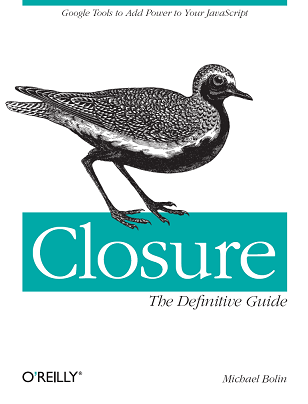Finding Closure from jquery
Starting to use Closure Tools with:
Who is this guy?
Rhys Brett-Bowen
- Australian
- Web App lead at Catch.com
- Started Closure Tools Meetup
- Wrote PlastronJS, The G, and some others
- Someone who found Closure
Closure Compiler
Advanced Optimizations
- Aggressive renaming
- Dead code removal
- Function inlining
- sourcemaps
What does this mean?
- More code - less bytes
- We can be verbose - the code won't be
- We can use longer name(space)s
- Unused code is removed
- Code will run faster
It's awesome!

Prove it!
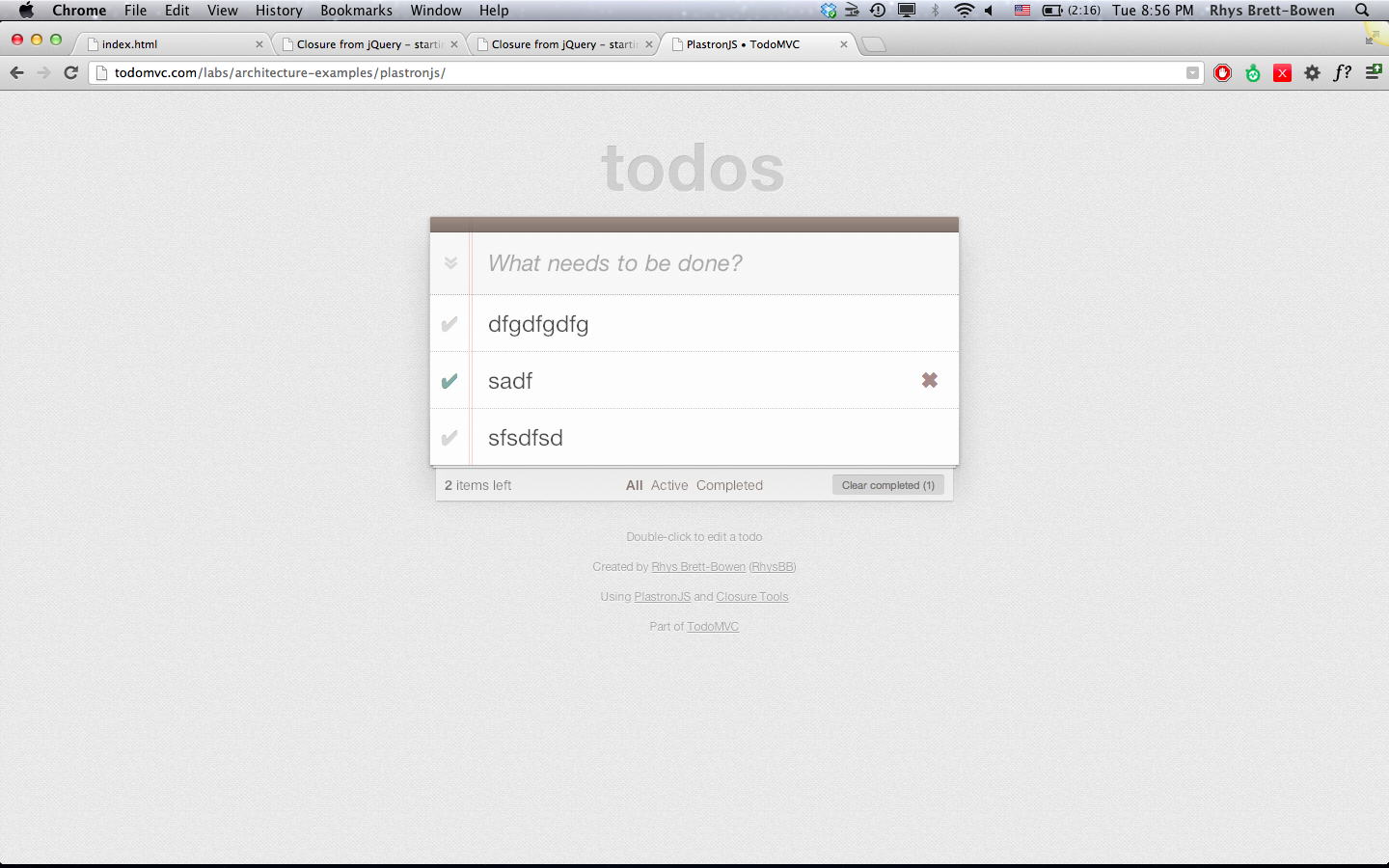
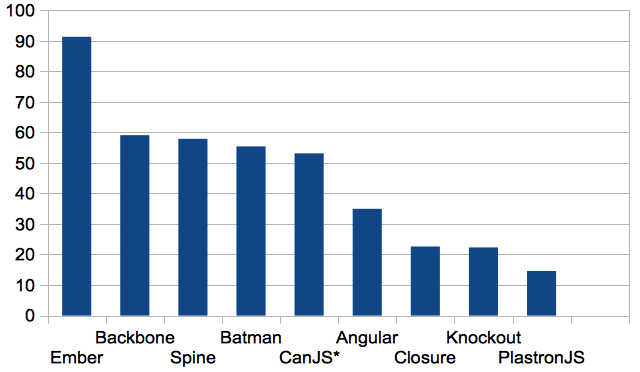
What's the catch

What's the catch?
Code must be AO compatible
- foo['bar'] !== foo.bar
- {foo: 'bar'} becomes {a: 'bar'}
- but {'foo': 'bar'} stays {'foo': 'bar'}
Use property when internal only and strings when value is external. Read more
What's the catch?
Code must be AO compatible
var Class = function() {};
Class.number = 1;- must provide Class.number to use externally (enums)
goog.provide('Class.Number')
/** @enum {number} */
Class.Number = {
ONE: 1,
TWO: 2
};What about using libraries that aren't compatible...
- externs
- Closure Library
Closure Library
Built for the compiler
- Classical inheritance
- Type annotations
- Dependency management
- goog.ui.Component
Classical inheritance
don't be afraid
goog.provide('Class');
goog.require('Super');
/**
* @constructor
* @extends {Super}
*/
Class = function() {
goog.base(this);
};
goog.inherits(Class, Super);
/**
* @inheritDoc
*/
Class.prototype.method = function(arg) {
return goog.base(this, 'method', arg);
};
Classical inheritance
Looks long, but autocomplete!
- Code organization
- Easy override functions
- Well understood
- Performance!
Type annotations
- Annotating
- Optional... mostly
- Don't need to be explicit
We'll see some in the code
Dependency management
goog.provide('namespace');
goog.require('othernamespace');
uncompiled
- goog.provide will create the objects needed for the namespace if they don't exist
- goog.require calls in files from goog.addDependency if not already done
- Need the goog.addDependecy file made using depswriter.py... or let plovr do it
compiled
- compiler will include all dependencies in a single file in the correct order
want Dependency Injection? try Loader
WeatherDemo
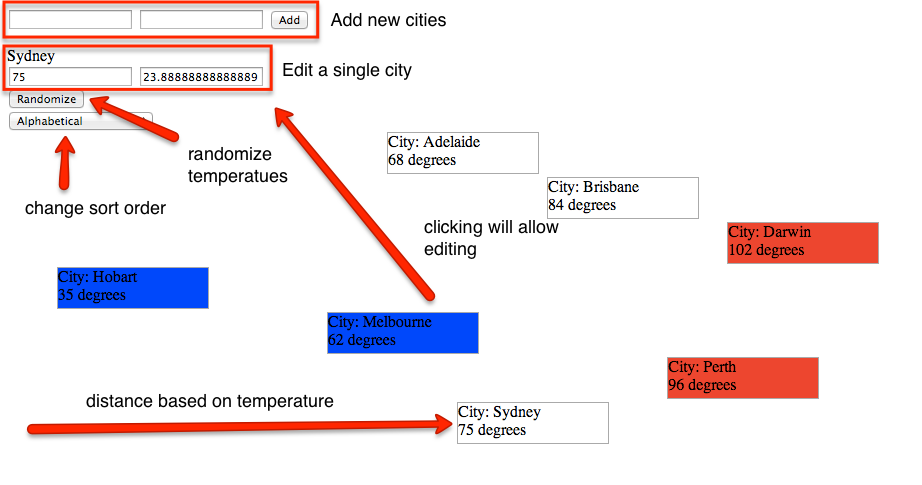
Plovr
no egrets

Setup with Plovr
- bundles compiler, templates and library
- Simple configuration
- Test runner
- Documentation generation
- Modules
WeatherDemo config
{
"id": "weatherdemo",
"paths": ["js/", "lib/", "templates/"],
"inputs": "js/main.js",
"mode": "ADVANCED",
"level": "VERBOSE",
"output_file": "compiled.js"
}add in to project
add in to index.html
<!-- or mode=compile -->
<script src="http://localhost:9810/compile?id=weatherdemo&mode=raw"></script>run from the command line
java -jar plovr.jar serve weatherdemo.jsonDone!
... or create the compiled js file
java -jar plovr.jar build weatherdemo.jsonCompiling might take some time...

but it's worth it, so use your time wisely

Setup a main function
main.js
goog.provide('WeatherDemo.main');
WeatherDemo.main = function() {};
// stops the name from compiling
goog.exportSymbol('WeatherDemo.main', WeatherDemo.main);index.html
<script>WeatherDemo.main();</script>Back to jQuery
jQuery has a great interface
$('.class').children().addClass('classChilren');
Closure Library...
- Namespacing great for discoverability
- Functional instead of OO
but...
goog.array.forEach(
goog.dom.getChildren(goog.dom.getElementByClass('class')),
function(child) {
goog.dom.classes.add(child, 'classChildren');
});
Learn a new library?
or just use an interface...
$('.class').children().addClass('classChilren');
The G!
Using the G
goog.require('G');- Just like jQuery - almost
- use $$.method instead of $.method
- $$.setSelectorEngine(engine) for better selector support
- Even some (simple) jQuery plugins may work - just add to $$.fn
PlastronJS

PlastronJS
MVC for Closure Library
- Define schemas on models
- Controls built on goog.ui.Component
- Control level event system
- Convenient model bindings
- Mediator
- Store
- also router and syncs
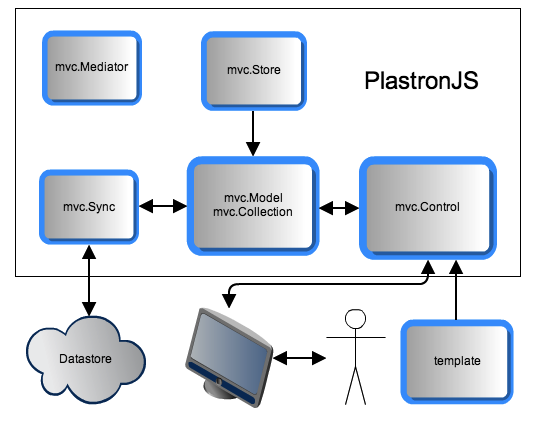
Schema for models
WeatherDemo.model.City.Schema = {
'celcius': {
get: function(temp) {
return 5 / 9 * (temp - 32);
},
/** @this {mvc.Model} */
set: function(num, opt_silent) {
this.set('temp', num * 9 / 5 + 32, opt_silent);
},
require: ['temp']
}
};or convenience functions
this.alias('farenheit', 'temp');read documentation for more
Mediator
- app wide messaging
- namespace messages
- can register objects to broadcast, then will decorate with broadcast method
- can initialize and dispose based on available message
- message matching with customizable wildcards
WeatherDemo.Mediator.register(this, 'chooseCity');
// then
this.broadcast('chooseCity', this.getModel().get('id'));WeatherDemo.Mediator.on('chooseCity', function(id) {...});Store
- single store for retrieval of models
- can create models given a type
- will retrieve models given an id (and update new models id when given)
WeatherDemo.Store = new mvc.Store(WeatherDemo.model.City);WeatherDemo.Store.get(city['id']);Let's talk about components
- mvc.Layout built on goog.ui.Component
- Component level events
- Handy selectors
- More to come
- mvc.Control built on mvc.Layout
- bindings to a model
- can handle models and collections
2 types of component
// render to create a component DOM structure
myComponent.render(el);
// this will fire:
myComponent.createDom(); // create the DOM structure, and set this.element_;// decorate to use existing DOM structure
myComponent.decorate(el);
// this will fire:
myComponent.canDecorate(el);// return if DOM structure is eligible
myComponent.decorateInternal(el); // any transforms on the DOOM neededThen enterDocument() will fire.
Component Lifecycle

Control events
- All control events use event delegation (to root element)
- Handlers are fired based on priority first (then order)
- returns an object that can .fire() the handler and .off()
this.on(eventType, fn, opt_selector, opt_handler, opt_priority).fire();Convenient model bindings
- bind methods bind to model (and return bound event objects)
- this.bind - mvc.Model
- this.bindAll - mvc.Model
- this.modelChange - mvc.Collection
- this.anyModelChange - mvc.Collection
- automatically clears bindings when disposed
- setModel() will change bindings to the new model
single.setModel(WeatherDemo.Store.get(id));
model bindings

this.autobind('.city', 'City: {$city}');
this.autobind('.temp', '{$farenheit} °F');
this.bind('temp', function(temp) {
$(this.getElement()).css('left', temp * 10 - 300);
}).fire();autobind does it all!

this.autobind('', {
reqs: ['celcius'],
reqClass: ['hot', 'mild'],
chooseClass: function(celcius) {
if (celcius > 30)
return 'hot';
if (celcius < 20)
return 'mild';
}
});even two way binding
this.autobind('.city', '{$city}');
this.autobind('.temp', '{$temp}');
this.autobind('.celcius', '{$celcius}');
// used to blur on enter so autobind will apply
this.on(goog.events.EventType.KEYUP, function(e) {
if (e.keyCode === goog.events.KeyCodes.ENTER) {
e.target.blur();
}
}, 'input');autolist
this.autolist(WeatherDemo.control.Simple, content);or override placement:
WeatherDemo.control.List.prototype.placeChild_ = function(
contentEl, child, index) {
$(child.getElement()).css({
'top': index * 45
});
};Let's see some code

More tools!
- templates
- linting
- stylesheets
- class minification
- testing
Closure Templates
- Compiled
- Extensible functions
- Client and Server-side
- Translatable strings
Closure Linter
- lints for the Google Javascript Style Guide
- Strict mode for contributing to Closure Library
- Style fixer
Linting
gjslint -r js
...
Found 17 errors, including 1 new errors, in 7 files (0 files OK).
... The script can be run by executing: fixjsstyle -r js
fixjsstyle -r js
gjslint -r js
...
Found 8 errors, including 0 new errors, in 5 files (2 files OK).
Closure Stylesheets
- Variables
- Extensible functions
- Mixins
- Conditionals
- Minification (including class name)
- Linting
Class minification
- Use Closure Stylesheets (coming soon in plovr)
- '-' separator
- goog.getCssName()
- {css className} in templates
// renaming separated by -
goog.getCssName('class-subclass') ==
goog.getCssName('class') + '-' + goog.getCssName('sublcass');
// select by class in The G and PlastronJS
$(goog.getCssName('-class'));What's next?
- Join the Meetup
- Discuss on the boards
- Read the documentation (use file index)
- Related projects:
- Leak Finder - find memory leaks
- Module Server
- este - development framework
- More to come!
Buy this book!
